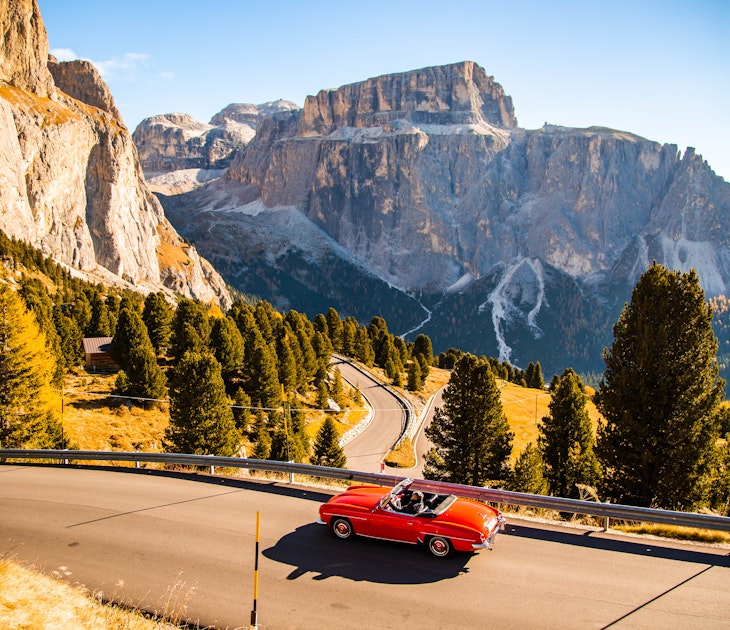

Hiking around the hills of Matera requires sturdy shoes – you won't regret bringing them © massimo colombo / Getty Images
You’ve finally planned your long-awaited trip to Italy. You’ve booked your flights. Made your hotel reservations. Booked your activities. Everything is ready to go – but what should you pack?
We’ve got practical packing advice to help you narrow down what to bring, what to buy before you leave and what to leave at home. So alongside the essentials — like your passport, phone, money, medicine and toiletries — these are the key items you should consider when packing for la bella Italia.
The most important thing to consider: shoes
You’ll likely be surprised by how much time you'll spend on your feet in Italy, so arguably one of the most important things to pack is a practical and comfortable pair of walking shoes. Let’s permanently shelve the myth that says if you wear tennis shoes or trainers you’ll be pegged as a tourist. It simply isn’t true. Italians often wear athletic-ish footwear around town – though they opt for more fashionable styles (like a pair of Supergas, an Italian sneaker brand) rather than beat-up gym shoes.
Cobblestones can play havoc with heels and ankles and with so much to see, you don't want to be in pain as you explore. There are also places, like Cinque Terre, where flip flops and sandals are forbidden. A comfortable pair of shoes that support walking a few miles on uneven terrain is a must – you’ll be thankful you squeezed them in.

Dress code: smart casual
Appearances matter in fashion-conscious Italy so casual chic is the way to go when eating out in city restaurants.
Many high-profile religious sites enforce dress codes, so if you want to get into St Peter’s Basilica or Venice’s Basilica di San Marco, play it safe and cover your shoulders, torso and thighs. A large scarf or wrap is always a versatile addition to navigate these issues (and can double as a blanket to keep you warm on your flight).
What to bring by season
Summer
Shorts, T-shirts and sandals are fine for sightseeing and relaxed beachside lounging. A hat can be a summer lifesaver, especially at the big archaeological sites where there’s often little shade. Sunglasses, sunscreen and insect repellent are a solid investment for the Italian summer.
Fall
Expect a few days of rain and cooler weather so along with cobblestone-friendly shoes with good tread, also pack a light sweater and waterproof jacket. Plan to dress like an onion and bring layers.
Winter
As the popular saying goes, there’s no bad weather, only bad clothing. You’ll need all your cold-weather gear: a warm coat, scarf, hat and gloves. Pack warm layers and don't forget an umbrella – it can be wet.
Spring
Again go with layers – but this time, the kind you can shed if the weather is warm. Pack a light sweater or waterproof jacket. Mosquitoes emerge in March (bring repellent!).
Make sure you bring adapters
Italy uses the standard 2-prong EU Type C plug with 230v. Make sure to use a converter if you’re from a country that uses a different voltage or risk damaging your electronics (or blowing a fuse — ask me how I know).
If it is your first time traveling or you haven’t done so in some time, check if some of your branded electronics have plug adaptors for your specific devices. For instance, Apple offers a that includes all the major plugs.

A manageable suitcase: packing relatively light
Maneuvering a large suitcase on cobblestones, up staircases and onto a train are the things nightmares are made of. Do yourself a favor and make sure your luggage is easily manageable. Remember that airlines have different weight, sizing and carry-on limits, and rental cars are notoriously small – remember to check those details before committing to luggage of any kind.
Check the weather and make a list of what you want to wear each day. Then go back and take out the things you’re not 100% sure you’ll wear or use. I ask myself, “Am I packing this because I need it or because I’m anxious or excited?” That usually helps me focus on what I actually need.
Nobody will know if you wear the same light sweater a few days in a row. You can always do laundry if you need to (and that’s likely less expensive than paying to check an extra bag if you’re flying with a low-cost carrier).
Bringing home olive oil and wine
One of the best things about traveling to Italy is bringing home all the delicious truffle and olive oil – and of course, the wine.
If you’re planning to buy larger bottles, you’ll to pack these in your checked luggage (unless you’re shipping them home.) These are a great way to pack them in your normal suitcase. They ziplock shut so the bottle won’t leak in your bag if it breaks.
Finally, if you plan to do a lot of shopping, consider packing an extra expandable tote that you can check on the return journey.
Explore related stories










